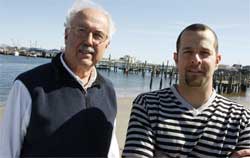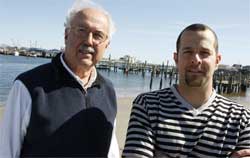 Findings may have implications for coastal communities worldwide
Findings may have implications for coastal communities worldwide
KINGSTON, R.I. –April 12, 2010—What is the value of Puerto Rico’s coastal resources? The resources have always played an important role in the economic health of its citizens, with many families working in coastal-related jobs in agriculture, retail, services, government, and local industries.
Yet there are many competing interests for waterfront land among real estate executives, businesses, tourism councils, high-end contractors, and people in local communities.
Is the coast’s value solely to be measured in dollars and cents? To what extent does small-scale coastal use contribute to well-being and quality of life for local residents? Aren’t access to quality food, enjoyment of healthy social relationships as well as resilience in the face of environmental and economic change other key measures of economic performance?
Those are the central questions URI anthropologists Carlos Garcia-Quijano of Providence and his colleague John Poggie of Wakefield in collaboration with Ana Pitchon from California State University in Domínguez Hills will try to answer, in their research among the residents of four southeastern Puerto Rican municipalities: Salinas, Guayama, Arroyo, and Patillas. A $115,900 National Oceanic and Atmospheric Administration -Sea Grant funds the two-year study.
Poggie has long studied marine anthropology in Latin America, including Puerto Rico. “His research is an important influence for my ideas and approaches, so I am very excited about this collaboration,” says colleague Garcia-Quijano who joined URI last year.
A native Puerto Rican, Garcia-Quijano has researched fisheries and resource use on Puerto Rico’s coast. Last fall, he won the American Anthropological Association’s Anthropology and the Environment Section’s Junior Scholar Award, which recognizes exemplary scholarship of talented scholars beginning their careers who are either untenured and/or within five years of obtaining a doctorate.
Employing a unique combination of social, ecological, and economic measures, the researchers will study coastal resource use across different sectors of society and social networks to trace the movement of coastal resource-associated goods and services in the communities, and environmental valuation techniques (like those used in ecological economics) to assess total value of coastal resource use. They will combine qualitative interviews, survey results and ecological monitoring to create a computer-based simulation model that will test hypotheses and simulate scenarios about the role of small-scale resource use in coastal communities and beyond.
The study may provide crucial evidence for arguments to protect coastlines and productive coastal communities from large-scale development and gentrification.
“Just like Puerto Rico, Rhode Island is a small state with a long tradition of seafaring and coastal resource use by rural coastal communities; and these communities are often struggling to compete with large-scale industrial and tourism interests,” says Garcia-Quijano. “With so many issues in common, our findings and research model could be used to further understand coastal resource use and dependence in Rhode Island.”
Pictured above
URI Professors (from left) John Poggie and Carlos Garcia-Quijano

